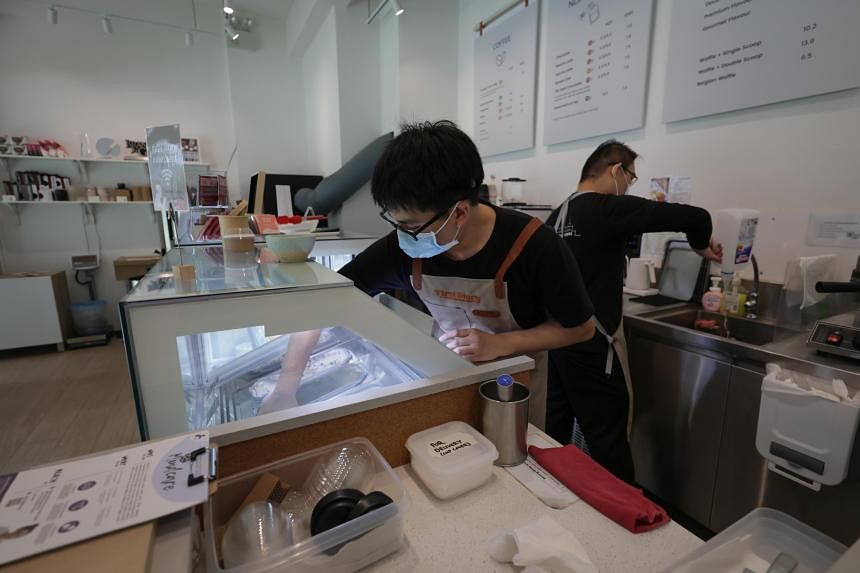SINGAPORE – Local firms that tap the initiatives announced in Budget 2024 to support them in adopting green solutions can stand to gain from lower set-up costs as well as a boost to competitiveness as suppliers to multinational companies.
Industry observers said that enhancements to the Enterprise Financing Scheme and the Energy Efficiency Grant, announced by Deputy Prime Minister Lawrence Wong during his Budget speech on Feb 16, can also bolster Singapore’s sustainability goals.
Mr Samuel Han, director of energy and sustainability management at Savills Singapore, said that enhancements to the Energy Efficiency Grant represent a significant opportunity for small and medium-sized enterprises (SMEs) here.
He said: “By enhancing the existing schemes, these grants serve as a powerful incentive for businesses to embrace green solutions and prioritise energy efficiency initiatives. This not only promotes environmental stewardship, but also offers tangible benefits for businesses, including cost savings and improved competitiveness.”
He added: “By incentivising the adoption of sustainable practices, the grants empower commercial organisations to play a more active role in reducing their carbon footprint and contributing to Singapore’s broader sustainability goals.”
First announced in 2022, the Energy Efficiency Grant provides local companies in the food services, food manufacturing and retail sectors with up to 70 per cent of financial support to invest in energy-efficient appliances such as LED lighting, air-conditioners, refrigerators, cooking hobs and water heaters.
As part of Budget 2024, the scheme will be expanded to include companies in more sectors, including manufacturing, construction and maritime, as well as data centres and their users.
Mr Nadi Chan, co-founder and director of Foreword Coffee Roasters, said that the Energy Efficiency Grant helped to lower set-up costs for the firm’s new cafes in 2022, thanks to the subsidies for them to purchase energy-efficient air-conditioners and refrigerators.
However, he noted that the company encountered obstacles such as appliance vendors being unaware of the scheme, or having insufficient stocks of the energy-efficient appliances.
“Having energy-efficient appliances can help SMEs like us save costs in the long run. They are also important for the company when it comes to environmental, social and corporate governance reporting,” he added.
Ms Priya Kini, head of commercial banking at HSBC, highlighted the need for collaborative efforts between the public and private sectors to assist firms, particularly small businesses, in transforming their business models and supply chains, as well as boosting their adoption of innovative technologies to achieve Singapore’s net-zero goals.
She said that these efforts will ensure that small businesses here not only stay relevant, but also continue to benefit from partnering with multinational corporations based in the region who are increasingly looking at working with suppliers that have adopted sustainable practices across the supply chain.
She added: “It is great to see the expansion of the Enterprise Financing Scheme to allow companies which are adopting green solutions to also benefit from it.
“As more companies adopt sustainable solutions, technologies or products, this will not only support the transformation of the industry as a whole, but also create new opportunities for other players across the economy.”
DPM Wong, who is also Finance Minister, also announced in his Budget speech that the Government will top up the Financial Sector Development Fund by $2 billion to give the Monetary Authority of Singapore more resources to extend the lead in the financial services sector.
The funding is not only to do more in core areas of banking, capital markets, asset management and insurance, but also to grow new areas such as fintech or financial technology, as well as green and transition finance.
DBS Bank chief sustainability officer Helge Muenkel said that the top-up is a welcome injection that will help Singapore establish itself as a global hub for green and transition finance.
He said: “Our hope is that this will enable an acceleration of green and transition financing – by scaling up the adoption and range of solutions – as well as catalyse greater public-private investment into blended finance models.”
Blended finance combines public funds with private investment to promote projects that contribute to sustainable development.
Mr Muenkel added: “Additional financial levers such as the tax credit scheme and loans for SMEs to adopt green solutions will also progress the move towards sustainable practices and contribute to fostering a more resilient and sustainable business landscape in Singapore.”


